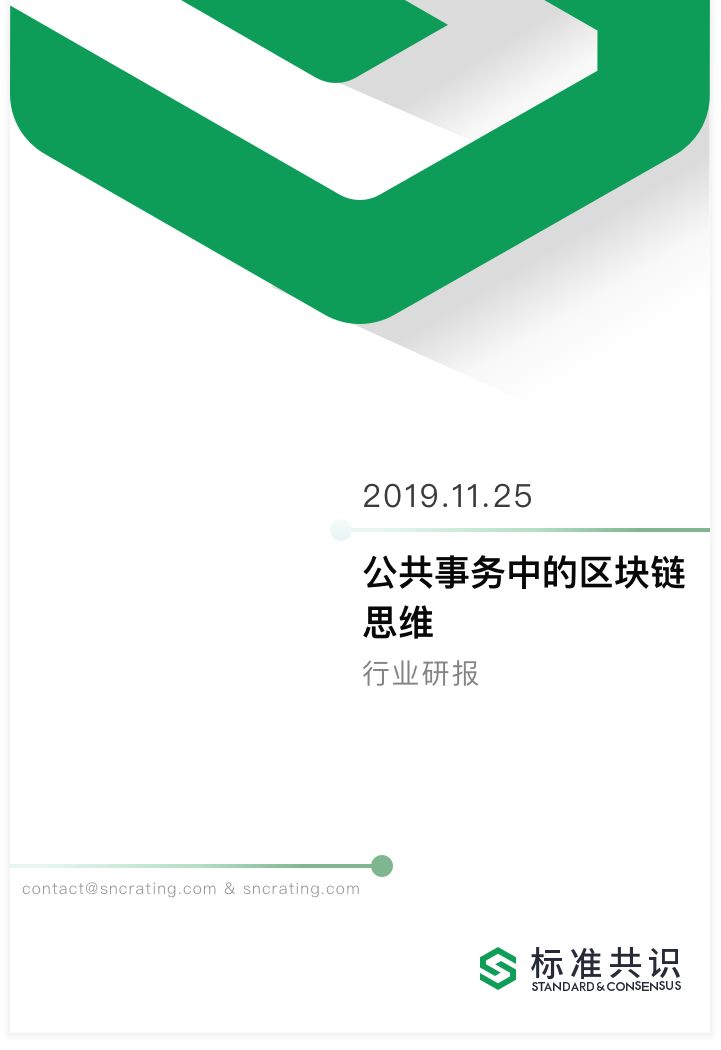An Example of Government Affairs System: Blockchain Thinking in Public Affairs

Overview Overview
Blockchain technology is a potential tool for improving government services and promoting greater transparency between government and citizenship. Blockchain technology can greatly optimize business processes through more efficient and secure data sharing. The blockchain has many possible applications in the public affairs department. Through blockchain technology, governments can improve the way they deliver services, prevent tax fraud, eliminate bureaucracy and reduce waste.
Report report:
Blockchain advantage
Building trust with citizens
A key function of the blockchain-based solution is to allow participants to view and verify data through decentralized transparency. Blockchain solutions for certain citizen services can allow independent verification of government requirements. For example, governments in Sweden, Estonia and Georgia are experimenting with blockchain-based land registration so that multiple parties can safely hold copies of the registration. This model can help resolve property disputes quickly or completely prevent property disputes. When citizens and governments share record access, the likelihood of distrust is reduced.
Protect sensitive data
In today's digital world, violating personal data has become a reality in life. The 2017 Equifax database leak revealed a full name, social security number, date of birth, address, and driver's license number for 143 million Americans. Only two years ago, hackers stole more than 20 million past and current government employee records from databases maintained by the Office of Personnel Management.
- Central Bank Shanghai Headquarters Graphic Blockchain: Blockchain virtual currency, developing blockchain technology away from virtual currency speculation
- Professor Gong Yi of China Europe International Business School: the dusk of the company and the dawn of the blockchain
- Graphic: Why is cryptocurrency investment diversified?
As the social default record holder, the government is the main target of hackers. However, if you do not consider such attacks as a business cost in the information age, you can mitigate or avoid these attacks by deploying blockchain data structures. Such data structures enhance network security by reducing the risk of single points of failure and make it extremely difficult to attempt a breakthrough attack.
Government agencies such as the US Department of Homeland Security are taking seriously the blockchain applications in cybersecurity. The Department of Homeland Security is funding blockchain startups to conduct research and development and explore new ways of network security. According to US Department of Homeland Security officials, "blockchain technology has the potential to change the way we manage online identities and access the Internet; this research and development project will help bring this potential closer to reality."
Reduce costs and increase efficiency
Government agencies must manage scarce resources responsibly while fulfilling their mission. Where appropriate, blockchain solutions can reduce redundancy, streamline processes, ease auditing burdens, improve security, and ensure data integrity.
Take the US General Services Administration's FASTLane process as an example. The system is used by the US General Services Administration to manage incoming bids from suppliers and currently requires 40 days to process incoming bids, but the US General Services Department's blockchain solution can help reduce processing time to 10 days. An official from the US General Services Administration recently stated that blockchain solutions can reduce the direct cost of analyzing proposals by nearly 80%.
Discussion on the example of blockchain government system
Land and home ownership registration
Using a blockchain makes sense to the government because what it does is actually keeping records. The government uses blockchain technology to place land and home ownership registration information on the blockchain to make it safer and more accessible. For example, Cook County, Illinois, has registered its ownership on the blockchain. After recording, no one can change it. This can be the basis for smart contracts to handle property liens or for more information.
If the Xiaoming Hukou is located in Beijing, but bought a house in Baoshan City, Yunnan Province. Through the use of blockchain technology, Xiaoming’s property ownership can be found in relevant institutions in Beijing. When Xiao Ming wants to sell a house in Yunnan, he does not have to go to the local government agency to handle the ownership transfer process, and he can operate it in Beijing.
Government lending
Government lending can also be changed through blockchain. Berkeley, California, is a good example. In May 2019, municipal officials voted to raise funds for community projects by issuing micro-bonds ranging from $10 to $25. Typical municipal bonds are at least $5,000. Often, the financing costs of issuing municipal bonds make such small-scale lending projects infeasible. But the blockchain cuts these costs because it allows the government to deal directly with buyers. According to reports, deputy mayor Ben Barlett said that combining micro-bonds with blockchain makes it easy to bypass traditional banks and thus save costs.
Government bid operation management
An example of blockchain improvement operations management is Wal-Mart's traceability system. When companies in the supply chain are reluctant to share data with each other, delays and faults in information traceback occur. But the blockchain can solve this problem. Wal-Mart uses blockchain to track its products. Prior to this, if a buyer became ill because of a product offered by Wal-Mart, it would take 6.5 days for the retailer to find out which farm it came from. After using the blockchain, Wal-Mart reduced it to 2.2 seconds.
In the same way, the blockchain can be used in public facilities projects to manage the traceability of the bidding company and its contractors. If there is a problem with the project, you can find the true responsible person through the blockchain traceability in the first time.
Digital identity
In terms of resident identification, Estonia and the state of Illinois are the forerunners of state-backed blockchain authentication. Estonia is using distributed ledger technology to modernize the country's registry, and Illinois is using Evernym's technology to register residents' birth information based on blockchains because of its unmodifiable nature. Will accompany the residents for a lifetime.
Personal credit
As a new technology combination, the blockchain ensures that the limited and controllable credit data sharing and verification can be realized on the basis of effectively protecting data privacy, which can effectively cope with the current status and pain points of the traditional credit information industry in China.
In 2006, Ping An Group established a financial technology department to explore the application of blockchain technology; Shanghai Credits Financial Technology Co., Ltd. launched a credit chain, which can be used to authorize encrypted shared blockchain technology based on self-developed encrypted information. Credit risk of small and medium banks and financial institutions.
Conclusion
Blockchain is a fundamental technology, but that doesn't mean we should only consider it from a technical perspective. The local and small-scale use of blockchain technology to serve the public affairs system can further accumulate experience and data for defining reliable blockchain implementations, thereby finally solving the common problems encountered by governments and citizens in public affairs, and This deepening ties with citizens deepens their trust in the government.
We will continue to update Blocking; if you have any questions or suggestions, please contact us!
Was this article helpful?
93 out of 132 found this helpful
Related articles
- Bitcoin Core 0.19.0 official version released, what new changes?
- Sidechains and status channels that are confusing concepts: What is the difference, who is better?
- Implementing cross-chaining between Fabric, Quorum, and Corda, the integration framework for superbooks is like this
- Chain Weekly reported that Shanghai, Shenzhen and other places have increased the fight against cryptocurrency transactions; the ecological development of the blockchain industry is still in full swing.
- Six indicators to explore the clues of the cryptocurrency market
- Depth | Jia Nan Technology: the first share of the global mining machine, industry extension to see AI
- QKL123 market analysis | megatrend has gone bad, miners are on the verge of loss (1125)






